
Find Help
More Items From Ergsy search
-

Am I affected by Sodium Valproate?
Relevance: 100%
-

What is the difference between sodium and salt?
Relevance: 39%
-

How does the body process salt?
Relevance: 17%
-

Does sweating increase my daily salt needs?
Relevance: 17%
-
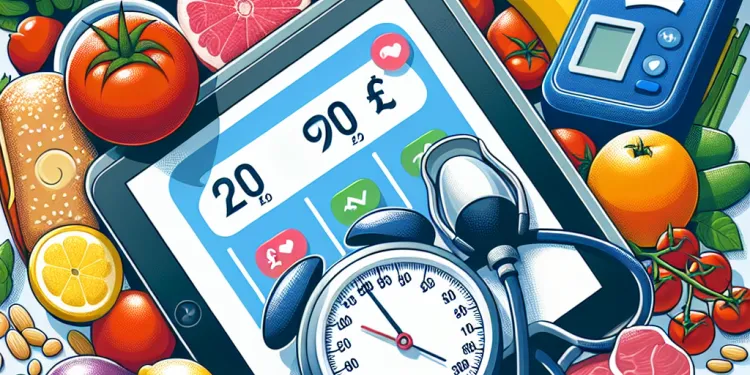
How does diet affect blood pressure?
Relevance: 15%
-
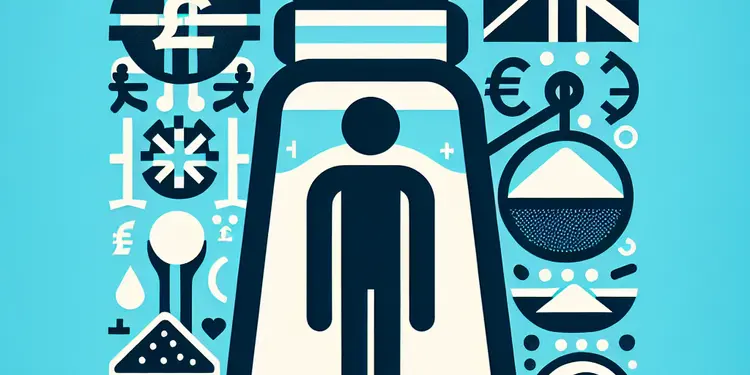
Is salt necessary for the body?
Relevance: 15%
-

What is the role of potassium in managing blood pressure?
Relevance: 14%
-
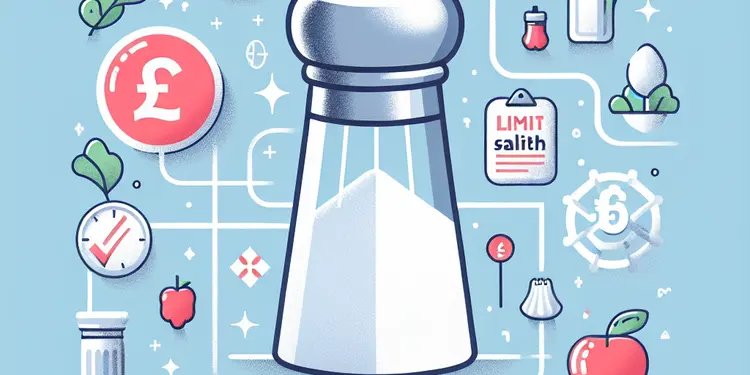
Why is it important to limit salt intake?
Relevance: 14%
-
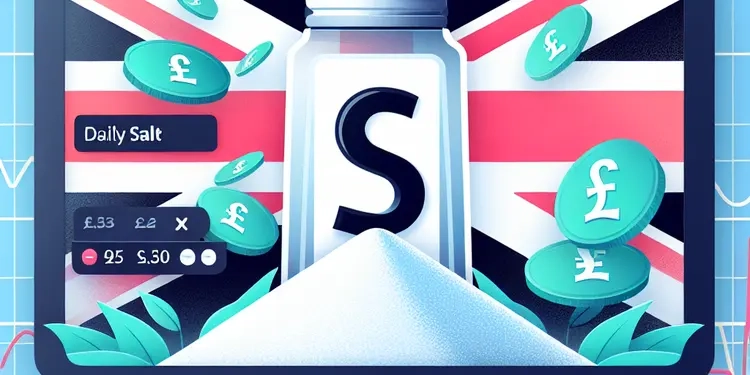
How much salt should I eat every day?
Relevance: 14%
-
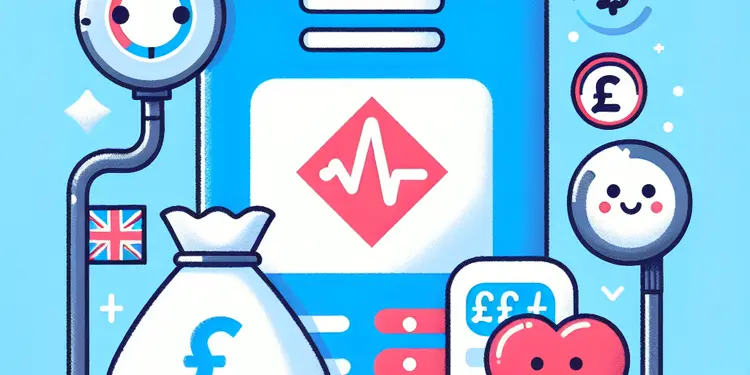
How does salt impact blood pressure?
Relevance: 14%
-

What is the DASH diet?
Relevance: 14%
-

What is the recommended daily intake of salt?
Relevance: 13%
-

Are sea salt and Himalayan pink salt better for you than table salt?
Relevance: 13%
-

Can low salt intake be harmful?
Relevance: 12%
-

What are some low-sodium alternatives to salt?
Relevance: 12%
-

What is the role of diet in managing heart failure?
Relevance: 12%
-

How can I reduce my salt intake?
Relevance: 12%
-

How does too much salt affect my health?
Relevance: 12%
-

What foods should I avoid to reduce my salt intake?
Relevance: 11%
-

Why is reducing aldosterone levels important?
Relevance: 11%
-

What should I eat to help with chronic kidney disease?
Relevance: 11%
-

How can I tell if I'm eating too much salt?
Relevance: 10%
-

What are hidden sources of salt in my diet?
Relevance: 10%
-
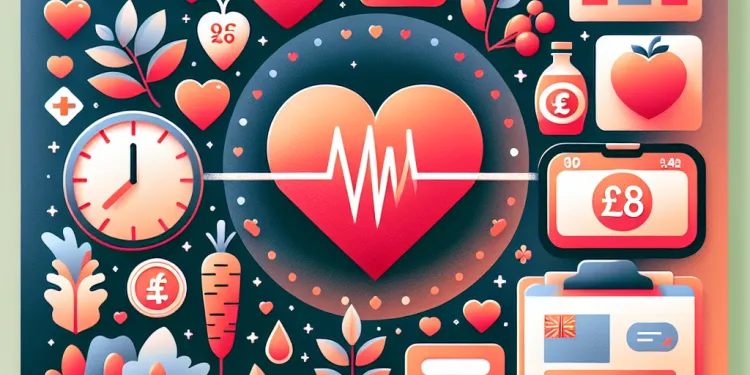
What lifestyle changes can lower blood pressure?
Relevance: 10%
-

Why is junk food considered unhealthy?
Relevance: 10%
-

NHSGGC - Diet and Chronic Kidney Disease (CKD)
Relevance: 9%
-

How can high blood pressure be treated?
Relevance: 9%
-

How does Baxdrostat work?
Relevance: 9%
-

Is certain salt better for those on a low-sodium diet?
Relevance: 9%
-

How can I balance my salt intake when eating out?
Relevance: 9%
-

Do all people need the same amount of salt?
Relevance: 9%
-

What is Baxdrostat used for?
Relevance: 8%
-
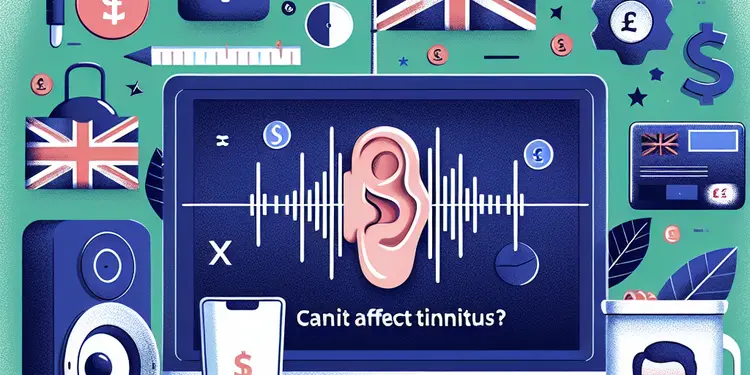
Can diet affect tinnitus?
Relevance: 8%
-

What is the ideal salt intake for someone with high blood pressure?
Relevance: 8%
-
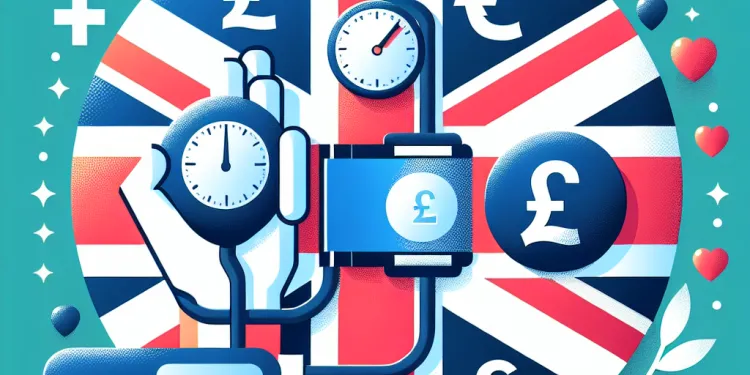
What is high blood pressure?
Relevance: 8%
-

How can I monitor my salt intake?
Relevance: 8%
-
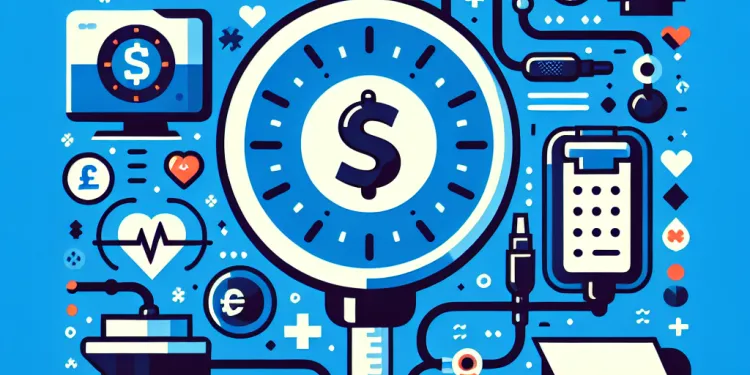
How do medications help control high blood pressure?
Relevance: 7%
-

What are common examples of junk food?
Relevance: 7%
-

How does junk food affect health?
Relevance: 7%
-
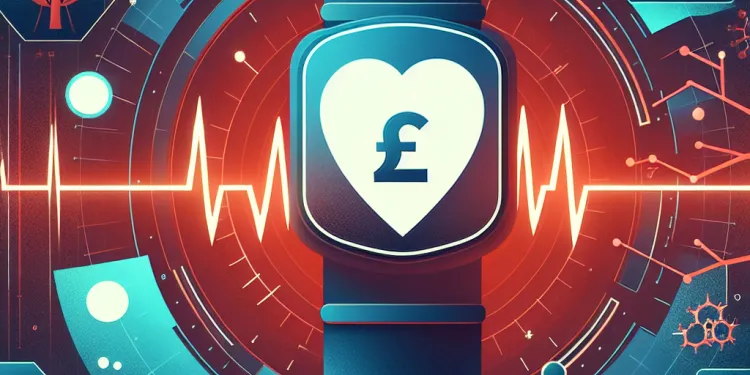
What causes high blood pressure?
Relevance: 6%
Am I Affected by Sodium Valproate?
Sodium Valproate is a medication primarily used to treat epilepsy, bipolar disorder, and occasionally, migraine headaches. It is important for residents in the United Kingdom taking this medication, or considering it, to understand its implications and effects.
Understanding Sodium Valproate
Sodium Valproate works by stabilizing electrical activity in the brain, which helps prevent seizures. It is a common prescription for individuals diagnosed with epilepsy. Despite its effectiveness, it can have significant side effects and risks, especially for certain groups of people.
Potential Side Effects
The use of Sodium Valproate can be associated with side effects such as nausea, tiredness, and dizziness. Some people may also experience hair loss or changes in weight. More severe side effects could include liver damage or pancreatitis, though these are less common. If you experience concerning symptoms, it is crucial to consult your healthcare provider.
Risks for Pregnant Women
For women in the UK who are pregnant or planning to become pregnant, Sodium Valproate poses a significant risk. The medication can cause congenital malformations and developmental issues in babies. It is highly advised that women who are pregnant avoid taking this medication, and those of childbearing age use effective contraception if prescribed Sodium Valproate. Healthcare providers typically discuss these risks and may offer alternative treatments.
Monitoring and Advice
Patients taking Sodium Valproate should have regular medical check-ups to monitor their health and the effectiveness of the treatment. Blood tests may be required to check liver function and the levels of the drug in the body. Always communicate openly with your doctor about any concerns or side effects you are experiencing. Adhering to the prescribed dosage without alteration is vital unless advised otherwise by a healthcare professional.
Conclusion
In the UK, Sodium Valproate is a widely used medication for managing epilepsy and bipolar disorder. However, awareness of its potential side effects, especially during pregnancy, is critical. Patients should maintain regular consultations with their healthcare provider to ensure safe and effective use of the medication. Always seek professional medical advice for any questions related to its effects.
Am I Affected by Sodium Valproate?
Sodium Valproate is a medication used primarily to treat epilepsy, bipolar disorder, and to prevent migraine headaches. It's a medication that has helped many in the UK; however, it carries significant considerations, especially for women of childbearing age. Understanding its impact on your health is crucial.
Understanding Sodium Valproate
Sodium Valproate functions by stabilizing electrical activity in the brain, which is essential for controlling seizures and mood swings. It is available under various brand names, one of the most common being Epilim. While highly effective, it’s crucial to be aware of its potential side effects and risks.
Risks for Women of Childbearing Age
One of the most critical concerns is the risk it poses to unborn children. Women taking Sodium Valproate during pregnancy are at a higher risk of having children with birth defects and developmental disorders. In the UK, stringent guidelines ensure women are aware of these risks, emphasizing the importance of contraception and regular consultation with healthcare professionals.
Possible Side Effects
Sodium Valproate can lead to various side effects, including drowsiness, gastrointestinal issues, and weight gain. Rarely, it can cause liver damage or pancreatitis. It’s important to communicate any adverse reactions to your doctor to monitor your health closely.
Regular Monitoring and Support
Regular reviews of your treatment plan and health status are advised. The NHS provides resources and support for those affected by Sodium Valproate, ensuring that the benefits and risks are carefully weighed and managed. Speak with your GP or specialist about any concerns or questions you may have regarding your medication.
Conclusion
Determining if you are affected by Sodium Valproate involves understanding its potential risks and side effects. As with all medications, informed discussions with healthcare providers should guide your treatment decisions. If you’re in the UK, leveraging available resources ensures safe and effective management of your condition.
Am I Affected by Sodium Valproate?
Sodium Valproate is medicine used to help with epilepsy, bipolar disorder, and sometimes headaches. If you live in the UK and take this medicine, or are thinking about it, it is important to know how it works and what it can do.
Understanding Sodium Valproate
Sodium Valproate helps the brain work better by stopping seizures. Many people who have epilepsy take this medicine. It works well, but it can also cause some problems, especially for certain people.
Potential Side Effects
Taking Sodium Valproate might make you feel sick, tired, or dizzy. Some people might lose hair or gain weight. Sometimes, it can hurt your liver or pancreas, but this is rare. If you feel bad while taking this medicine, talk to your doctor.
Risks for Pregnant Women
If you are a woman in the UK who is pregnant or wants to become pregnant, Sodium Valproate can be very risky. It can cause problems for the baby. Pregnant women should not take this medicine, and women who can get pregnant should use protection. Doctors will usually talk about these risks and may suggest other medicines.
Monitoring and Advice
If you take Sodium Valproate, go to the doctor regularly. The doctor might do blood tests to check how your liver is doing and how much of the medicine is in your body. Always tell your doctor if you feel any side effects. Take the medicine exactly as the doctor says. Do not change how much you take unless your doctor tells you to.
Conclusion
In the UK, people use Sodium Valproate to help with epilepsy and bipolar disorder. But, you need to know about the side effects, especially if you are pregnant. Keep seeing your doctor to make sure the medicine is safe for you. Always ask your doctor if you have any questions about what the medicine can do.
Am I Affected by Sodium Valproate?
Sodium Valproate is a medicine. It helps people with epilepsy and mood problems like bipolar disorder. It can also stop migraine headaches. Many people in the UK take it. But, for women who can have babies, it is important to be careful. Knowing how it affects you is very important.
What is Sodium Valproate?
Sodium Valproate helps control the way the brain works. It stops seizures and helps with mood swings. It has different brand names, like Epilim. It works well, but you should know about the side effects and risks.
Risks for Women Who Can Have Babies
If a woman takes Sodium Valproate while pregnant, it can harm the baby. The baby might have birth problems or find it hard to learn or grow. In the UK, there are rules to help women know these risks. It's important to use birth control and talk to a doctor often.
Side Effects You Might Notice
Sodium Valproate can make you sleepy. It might upset your stomach or make you gain weight. Rarely, it can hurt your liver or pancreas. Tell your doctor if you feel any bad effects so they can help you stay safe.
Regular Checks and Help
It is important to have regular check-ups. The NHS has support for people taking Sodium Valproate. They help you understand the good and bad sides of the medicine. Talk to your GP or specialist if you have questions or worries about your medicine.
Conclusion
Finding out if Sodium Valproate affects you means learning about its risks and side effects. Always talk with your doctor to make the best choices for your health. In the UK, there are resources to help you use your medicine safely.
Frequently Asked Questions
What is Sodium Valproate used for?
Sodium Valproate is primarily used to treat epilepsy and bipolar disorder. It helps stabilize electrical activity in the brain.
Am I affected by Sodium Valproate?
If you are taking Sodium Valproate or have been advised to use it for treatment of medical conditions like epilepsy or bipolar disorder, then it affects you.
What are the risks of taking Sodium Valproate during pregnancy?
Taking Sodium Valproate during pregnancy can lead to birth defects and serious developmental disorders in the unborn child. Women of childbearing age should use effective contraception if taking Sodium Valproate.
Can I switch from Sodium Valproate to another medication?
Switching from Sodium Valproate to another medication should only be done under medical supervision. Discuss options with your healthcare provider.
Are there alternatives to Sodium Valproate?
Yes, there are alternative medications for treating epilepsy and bipolar disorder. A healthcare provider can suggest the most appropriate option based on individual health needs.
What should I do if I'm currently taking Sodium Valproate and pregnant?
Contact your healthcare provider immediately if you are pregnant while taking Sodium Valproate. Do not stop taking the medication suddenly, as this can lead to seizures.
What are the common side effects of Sodium Valproate?
Common side effects can include nausea, tremors, weight gain, hair loss, and tiredness. Report any severe or worrying symptoms to your doctor.
How can I report side effects in the UK?
In the UK, side effects can be reported through the Yellow Card Scheme, which allows patients and healthcare professionals to report adverse effects of medications.
Is Sodium Valproate safe for children?
Sodium Valproate is sometimes prescribed to children for epilepsy, but its use must be carefully monitored due to potential risks.
Can Sodium Valproate affect mental health?
Sodium Valproate can affect mood and behavior. Notify your healthcare professional if you notice significant changes in mood or mental health.
How does Sodium Valproate interact with other medications?
Sodium Valproate can interact with other medications and alter their effectiveness. Always inform your doctor about any other medicines you are taking.
What precautions should I take while using Sodium Valproate?
Avoid alcohol, use effective contraception if of childbearing age, and attend regular check-ups to monitor your health while using Sodium Valproate.
Can I drink alcohol while taking Sodium Valproate?
It is generally advised to limit or avoid alcohol while taking Sodium Valproate, as it can enhance drowsiness and increase the risk of side effects.
How can I safely stop taking Sodium Valproate?
Do not stop taking Sodium Valproate suddenly. Tapering off the medication should be done under medical supervision to minimize the risk of seizures or other withdrawal effects.
Where can I find more information about Sodium Valproate in the UK?
For more detailed information, visit the NHS website or consult a healthcare professional. The Medicines and Healthcare products Regulatory Agency (MHRA) also provides updates and information on medications.
What is Sodium Valproate used for?
Sodium Valproate is medicine that helps people. It is used to stop seizures, which are sudden changes in the brain. It can also help with mood problems.
Remember: Always talk to an adult you trust if you have questions. They can help you find more information.
Sodium Valproate is a medicine. It helps people who have epilepsy and bipolar disorder. It works by calming the brain.
Does Sodium Valproate Affect Me?
Sodium Valproate is a medicine. It helps some people with seizures and mood problems.
Are you taking Sodium Valproate? Do you think it might be affecting you?
Here are some things you can do:
- Talk to your doctor or nurse. They can help you understand more.
- Ask questions if you feel unsure.
- Tell an adult you trust about how you feel.
You can use tools like pictures or apps to help you understand better.
If you are taking Sodium Valproate or your doctor said to use it for health problems like epilepsy or bipolar disorder, then it is important for you.
What are the risks of taking Sodium Valproate during pregnancy?
Sodium Valproate is a medicine. It can help some people. But it can be risky for babies if a pregnant person takes it. Here are the risks:
- The baby might not grow in the usual way.
- The baby could have problems with learning or moving.
- The baby might have a hard time hearing.
If you are pregnant, talk to your doctor before taking Sodium Valproate. You can ask the doctor to help you find safer choices.
Here are some tips to help you understand:
- Ask someone you trust to explain difficult words.
- Use pictures or drawings to help you understand.
- Take your time and ask questions if you need more information.
Taking a medicine called Sodium Valproate when you are going to have a baby can cause serious problems for the baby. It can make the baby sick or have learning problems. If you are a woman who can have a baby and need to take this medicine, make sure you use something to stop you from getting pregnant. You can talk to your doctor about what to do.
Can I change from taking Sodium Valproate to a different medicine?
Talk to your doctor before you change from taking Sodium Valproate to a different medicine. Your doctor will help you find the best choice.
Are there other choices instead of Sodium Valproate?
Sodium Valproate is a type of medicine. Sometimes, people need different medicines for their health. If you cannot take Sodium Valproate, ask your doctor for other options.
Here are some ways to help you understand this:
- Talk to your doctor or nurse. They know a lot about medicine.
- Use pictures or drawings to help explain things.
- Write down the names of other medicines to remember them.
Yes, there are other medicines to help with epilepsy and bipolar disorder. A doctor or nurse can help choose the best one for you.
What do I do if I am taking Sodium Valproate and I am having a baby?
If you take Sodium Valproate and are pregnant, talk to your doctor right away. They will help you know what to do.
Here are some tips:
- Write down questions you want to ask your doctor.
- Take a friend or family member to your appointment for support.
- Ask your doctor if there are other medicines that are safer for your baby.
Your health and your baby's health are important. Always ask for help if you need it.
If you are having a baby and taking Sodium Valproate, talk to your doctor right away. Do not stop taking the medicine all at once, or you might have a seizure.
What bad things can happen with Sodium Valproate?
Sodium Valproate is medicine. Sometimes it can make people feel not so good. Here are some things to watch out for:
- Tummy might hurt or feel sick.
- You might feel sleepy or tired.
- You may gain weight.
- Hair might fall out a little bit.
If you feel worried or get any of these, tell a grown-up or a doctor. It's always good to have someone to talk to about it. Use pictures or drawings to help explain feelings and changes.
Some common side effects are feeling sick, shaking, getting heavier, losing hair, and feeling very tired. If anything feels really bad or makes you worried, tell your doctor.
How do I tell someone about side effects in the UK?
If you feel unwell after taking medicine, you should tell someone. This could be your doctor or a grown-up you trust.
You can also tell the people who made the medicine. This is called “reporting side effects.”
In the UK, you can use a special website called the Yellow Card Scheme. An adult can help you do this.
If it is hard for you to read or write, you can ask a friend or family member to help. You can also call a special phone number for help.
In the UK, there is a way to tell someone if medicine makes you feel bad. It is called the Yellow Card Scheme. You, your doctor, or a nurse can use it to say when medicine causes problems.
Is Sodium Valproate safe for children?
Sodium Valproate is a medicine. Doctors give it to some children. It helps with fits or seizures.
Some children have fits. A fit is when your brain acts differently. Sodium Valproate helps stop fits.
Ask your doctor before giving any medicine. Medicine can help but can have side effects. Side effects are unwanted things that can happen.
Your child’s doctor will help you understand if Sodium Valproate is right for your child.
If you have questions, talk to your doctor. You can also ask a pharmacist. A pharmacist is someone who knows a lot about medicine.
Using pictures can help understand medicine better. Drawing or writing down what the doctor says can help remember.
Sodium Valproate is a medicine that doctors sometimes give to children who have epilepsy. Epilepsy is a condition that causes seizures. Doctors need to watch how the medicine affects the child because it can have some risks.
Can Sodium Valproate affect how I feel?
Sodium Valproate is a medicine.
It can help with fits and feeling very sad.
Sometimes, it might change how we feel.
If you feel worried or different, talk to an adult you trust or a doctor.
Use tools like drawing or talking to help you share your feelings.
Sodium Valproate can change how you feel or act. Tell your doctor if you feel very different or have big changes in how you think or feel.
How does Sodium Valproate mix with other medicines?
Sodium Valproate is a medicine. It can mix with other medicines in your body.
Sometimes, mixing medicines can change how they work. It can make them stronger or weaker. Always talk to your doctor or a pharmacist before taking new medicines with Sodium Valproate.
Here are some tips:
- Ask a doctor: They can tell you if it's safe to take Sodium Valproate with other medicines.
- Use a medicine reminder app: It can help you keep track of your medicines.
- Keep a list of your medicines: Write down all the medicines you take. Show it to your doctor.
Sodium Valproate is a medicine. It can mix with other medicines and change how they work. Always tell your doctor about all the medicines you take.
What should I do to stay safe when using Sodium Valproate?
If you take Sodium Valproate, here are some tips to help keep you safe:
- Talk to your doctor before starting. They will tell you how much to take.
- Always follow the instructions from your doctor.
- If you have questions, ask your doctor or nurse.
- Keep a list of your medicines to show your doctor.
- If you feel unwell, tell an adult you trust.
You might need help from:
- Your family or friends to remind you to take your medicine.
- A pill organizer to keep track of your doses.
Remember, taking medicine can be important to help you feel better. Always be safe and ask for help if you need it.
Don't drink alcohol. If you can have babies, use birth control that works well. Go to the doctor often to check your health if you are taking Sodium Valproate.
Can I drink alcohol when taking Sodium Valproate?
It is not safe to drink alcohol when you are taking Sodium Valproate.
Alcohol can make the medicine not work well. It can also make you feel very tired or dizzy.
If you have any questions, talk to your doctor or pharmacist.
Use a calendar or phone app to remind you about your medicine. Ask someone to help you if needed.
Try not to drink alcohol when taking Sodium Valproate. Alcohol can make you more sleepy and can make side effects worse.
How do I stop taking Sodium Valproate safely?
Do not stop taking Sodium Valproate all at once. If you need to stop, do it slowly with help from your doctor. This way, you won’t have problems like seizures.
Where can I learn more about Sodium Valproate in the UK?
Sodium Valproate is a medicine. It helps some people feel better. If you want to learn more about it in the UK, here are some ways:
- Ask your doctor or nurse. They can tell you about Sodium Valproate.
- Look on the NHS website. The NHS is a trusted health service in the UK.
- Visit your local pharmacy. Pharmacists know a lot about medicines.
- Read the leaflet that comes with the medicine. It has important information inside.
If reading is hard, ask someone to read it to you. You can also use tools that read text out loud or show pictures to help you understand better.
For more information, go to the NHS website. You can also talk to a doctor or nurse. The MHRA can give you news about medicines.
Useful Links
This website offers general information and is not a substitute for professional advice.
Always seek guidance from qualified professionals.
If you have any medical concerns or need urgent help, contact a healthcare professional or emergency services immediately.
- Ergsy carfully checks the information in the videos we provide here.
- Videos shown by Youtube after a video has completed, have NOT been reviewed by ERGSY.
- To view, click the arrow in centre of video.
- Most of the videos you find here will have subtitles and/or closed captions available.
- You may need to turn these on, and choose your preferred language.
- Go to the video you'd like to watch.
- If closed captions (CC) are available, settings will be visible on the bottom right of the video player.
- To turn on Captions, click settings .
- To turn off Captions, click settings again.
More Items From Ergsy search
-

Am I affected by Sodium Valproate?
Relevance: 100%
-

What is the difference between sodium and salt?
Relevance: 39%
-

How does the body process salt?
Relevance: 17%
-

Does sweating increase my daily salt needs?
Relevance: 17%
-

How does diet affect blood pressure?
Relevance: 15%
-

Is salt necessary for the body?
Relevance: 15%
-

What is the role of potassium in managing blood pressure?
Relevance: 14%
-

Why is it important to limit salt intake?
Relevance: 14%
-

How much salt should I eat every day?
Relevance: 14%
-

How does salt impact blood pressure?
Relevance: 14%
-

What is the DASH diet?
Relevance: 14%
-

What is the recommended daily intake of salt?
Relevance: 13%
-

Are sea salt and Himalayan pink salt better for you than table salt?
Relevance: 13%
-

Can low salt intake be harmful?
Relevance: 12%
-

What are some low-sodium alternatives to salt?
Relevance: 12%
-

What is the role of diet in managing heart failure?
Relevance: 12%
-

How can I reduce my salt intake?
Relevance: 12%
-

How does too much salt affect my health?
Relevance: 12%
-

What foods should I avoid to reduce my salt intake?
Relevance: 11%
-

Why is reducing aldosterone levels important?
Relevance: 11%
-

What should I eat to help with chronic kidney disease?
Relevance: 11%
-

How can I tell if I'm eating too much salt?
Relevance: 10%
-

What are hidden sources of salt in my diet?
Relevance: 10%
-

What lifestyle changes can lower blood pressure?
Relevance: 10%
-

Why is junk food considered unhealthy?
Relevance: 10%
-

NHSGGC - Diet and Chronic Kidney Disease (CKD)
Relevance: 9%
-

How can high blood pressure be treated?
Relevance: 9%
-

How does Baxdrostat work?
Relevance: 9%
-

Is certain salt better for those on a low-sodium diet?
Relevance: 9%
-

How can I balance my salt intake when eating out?
Relevance: 9%
-

Do all people need the same amount of salt?
Relevance: 9%
-

What is Baxdrostat used for?
Relevance: 8%
-

Can diet affect tinnitus?
Relevance: 8%
-

What is the ideal salt intake for someone with high blood pressure?
Relevance: 8%
-

What is high blood pressure?
Relevance: 8%
-

How can I monitor my salt intake?
Relevance: 8%
-

How do medications help control high blood pressure?
Relevance: 7%
-

What are common examples of junk food?
Relevance: 7%
-

How does junk food affect health?
Relevance: 7%
-

What causes high blood pressure?
Relevance: 6%


